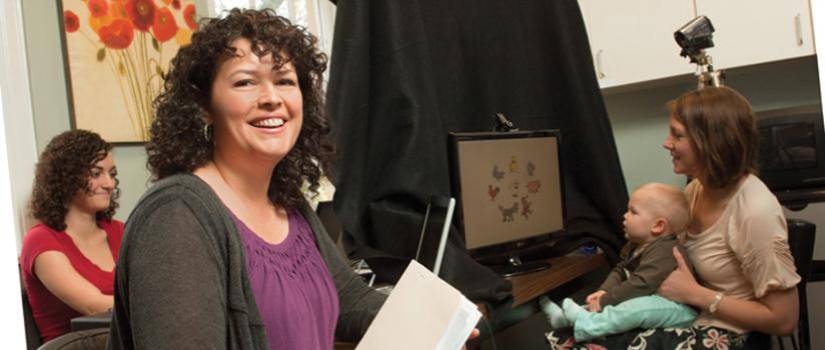The building on the western edge of the University of South Carolina campus is home to the Neurodevelopmental Disorders Research Lab, where undergraduates, graduate students and faculty members make the incremental advances typical of social science work. The lab is Roberts’ research effort focusing on the early diagnosis and treatment of autism, attention deficit hyperactivity disorder and other developmental disabilities.
Roberts was drawn to Columbia seven years ago from a research position at the University of North Carolina because she saw tremendous potential in an unusual setup. Her clinical background was in school-based psychology dealing with developmental disabilities, but she recognized the key to helping those children was rooted in early intervention – long before they reached school age.
Most universities place researchers with her background in their education department. The College of Arts and Sciences saw the value of basing her work in the psychology department. Roberts loved the idea.
“It was a rare opportunity to fit into a department and a program that I have not found elsewhere,” Roberts says. “I do more basic science research with infants, which is not traditional for school psychology.”
At the time of her hire, Roberts’ main line of research focused on Fragile X syndrome, a genetic mutation to a single gene that often is associated with intellectual disabilities. Early scholarly papers on the link between Fragile X and autism drew little attention. Then around the time Roberts came to USC, as diagnosed rates of autism soared, interest in the connection also took off.
“About 5 percent of kids with autism have Fragile X,” Roberts says. “That may not sound like a lot, but it actually is the most common known cause of autism. That tells you we don’t know what causes autism.”
Roberts’ lab is at the heart of the effort to learn more about those causes, to discover the best ways to diagnose the disorders early and come up with intervention methods that help diminish the disabilities those children face later in life.
As director of the School Psychology Program in the College of Arts & Sciences, Roberts teaches developmental psychology at the undergraduate level. Many of her students move on to undergraduate independent study courses in the Neurodevelopmental Disorders Lab. As many as 16 undergraduates work in the lab throughout the year alongside Roberts, a couple of post-doctoral researchers, three full-time staff funded by grants and five graduate students.
“Many undergraduates come to the lab with the goal of wanting to be clinical psychologists,” Roberts says. “The typical undergraduate thinks of research as a boring, sterile, unimportant process. And I’ve seen them get engaged and become very excited about the research process. That is very rewarding.”
Many earn grants to work on research projects as undergraduates and move on to graduate programs, along the way soaking up some of Roberts’ passion for finding answers.
Roberts was not drawn to the early autism diagnosis field due to personal reasons, her family has no history of autism or developmental disabilities. She discovered her passion for the field while working as a school psychologist for seven years in the public school system before returning to graduate school for her Ph.D.
“I was drawn from the get-go to children who had special needs,” Roberts says. “My work was fueled by being in the school system and seeing all these children who already had established learning disabilities. I wanted to know: How did these conditions emerge and what could we do to either prevent a disability from occurring or to minimize its severity?”
Because autism is an incredibly complex condition, research tends to consider multiple factors. The Fragile X link presents unique opportunities to advance our understanding of gene-brain-behavior relationships. Some of Roberts’ studies are using eye tracking and heart rate to test attention deficits in infants at risk for autism. Another study is looking at the role of genetic variables as they impact stress levels of mothers and potentially affect the child’s behavior. It is a transactional approach where genetic vulnerabilities are studied in the context of both child and parent interactions that vary over time and across environments.
“The question used to be ‘Is this due to genes or to the environment?’” Roberts says. “Now we know it is genes AND environment almost all the time, but the question now is to what degree genes are affecting outcomes and how does the environment affect those outcomes. We’re going to peel back one little layer for one little group at a time, and collectively in 10 or 20 years we’ll have a better picture. It’s a long journey.”
